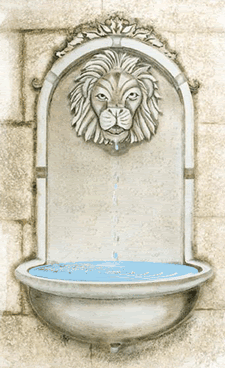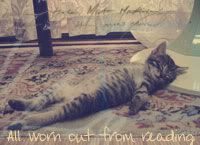I Should Put the Odds at 10,000 to 1 Against You All
 I don't think Tolkien influenced me*, and I am certain that I didn't influence him. That is, didn't influence what he wrote. My continual encouragement, carried to the point of nagging, influenced him very much to write at all with that gravity and at that length. In other words I acted as a midwife not as a father. The similarities between his work and mine are due, I think, (a) To nature - temperament. (b) to common sources. We are both soaked in Norse mythology, George MacDonald's fairy-tales, Homer, Beowulf, and medieval romance. Also, of course, we are both Christians (he, an R.C.).
I don't think Tolkien influenced me*, and I am certain that I didn't influence him. That is, didn't influence what he wrote. My continual encouragement, carried to the point of nagging, influenced him very much to write at all with that gravity and at that length. In other words I acted as a midwife not as a father. The similarities between his work and mine are due, I think, (a) To nature - temperament. (b) to common sources. We are both soaked in Norse mythology, George MacDonald's fairy-tales, Homer, Beowulf, and medieval romance. Also, of course, we are both Christians (he, an R.C.).The relevance of your problem to 'Higher Criticism' is extremely important. Reviewers of his books and mine, both friendly & hostile, constantly put forward imaginary histories of their composition. I do not think any one of these has ever borne the slightest resemblance to the real history. (e.g. they think his deadly Ring is a symbol of the atom bomb. Actually his myth was developed long before the atom bomb had been heard of).
You see the moral. These critics, in dealing with us, have every advantage which modern scholars lack in dealing with Scripture. They are dealing with authors who have the same mother tongue, the same education, and inhabit the same social & political world as their own, and inherit the same literary traditions. In spite of this, when they tell us how the books were written they are all wildly wrong! After that what chance can there be that any modern scholar can determine how Isaiah or the Fourth Gospel [...] came into existence? I should put the odds at 10,000 to 1 against you all. [...]
The Narnian series is not exactly allegory. I'm not saying 'Let us represent in terms of märchen** the actual story of this world.' Rather 'Supposing the Narnia world, let us guess what form the activities of the Second Person or Creator, Redeemer, and Judge might take there.' This, you see, overlaps with allegory but is not quite the same.
I don't think a marsh-wiggle is like a hobbit. The hobbit is essentially a cheerful, complacent, sanguine little creature. If Puddeglum is like any of Tolkien's characters, I'd call him 'a good Gollum'.
~C.S. Lewis, The Collected Letters of C.S. Lewis: Volume III, Letter to Francis Anderson 23 Sept 1963
_______________________
* Anderson had written to Lewis asking what the connection was between the Lord of the Rings and the Narnia series and which writer had influenced the other.
**märchen - the German term for tales of enchantment and marvels, usually translated as ‘fairy tales’.




1 Comment(s):
10,000 to 1 (or lower!)
Thanks.
Post a Comment
<< Home